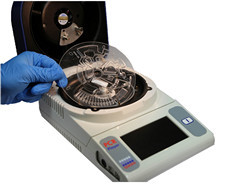Saving newborns with neonatal sepsis
Neonatal sepsis is a life-threatening inflammatory condition caused by pathogens entering the bloodstream of newborn babies. The clinical signs of neonatal sepsis are non-specific, making it hard to distinguish from other conditions such as respiratory distress syndrome or meningitis. Limitations in the prompt diagnosis of infant sepsis render it one of the major causes of mortality in infants. The EU-funded ASCMICROPLAT(opens in new window) (Fast automated multiplex analysis of neonatal sepsis markers on a centrifugal microfluidic platform) project addressed this issue through the development of a novel diagnostic platform capable of performing rapid diagnosis of neonatal sepsis. It essentially allows detection of a whole panel of neonatal sepsis pathogens and sepsis biomarkers in human serum samples within four hours. Biomarker quantification takes place through a novel magnetic immuno-PCR approach or by an enzyme-linked immunosorbent assay. Pathogen identification is based on an automated process of bacterial DNA extraction and amplification adapted to microfluidic modules. The generated ASCMICROPLAT test proved to be highly sensitive, allowing the detection of pathogens at extremely low bacterial loads. Validation of the assay in clinical samples indicated that it is comparable to blood cultures, the gold standard of bacterial identification. The consortium is in the process of upscaling the fabrication of the tests on polymer foils to industrial levels. Currently, disease management involves broad-spectrum antibiotic administration in neonates who are at high risk of developing sepsis, resulting in several adverse effects. The ASCMICROPLAT system facilitates the fast, automated routine diagnosis of neonatal sepsis permitting timely and targeted antibacterial treatment. Implementation of this novel tool will reduce the unspecific use of antibiotics and improve treatment efficiency.







